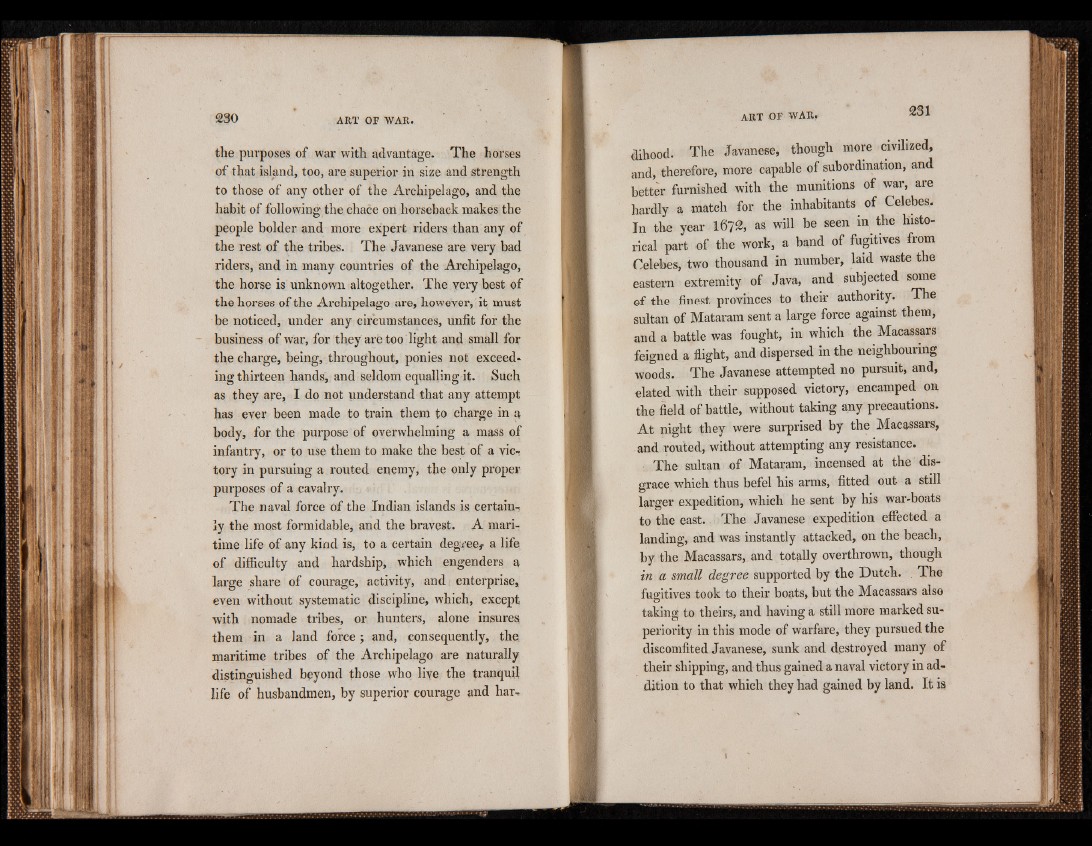
the purposes of war with advantage. The horses
of that island, too, are superior in size and strength
to those of any other of the Archipelago, and the
habit of following the chace on horseback makes the
people bolder and more expert riders than any of
the rest of the tribes. The Javanese are very bad
riders, and in many countries of the Archipelago,
the horse is unknown altogether. The very best of
the horses of the Archipelago are, however, it must
be noticed, under any circumstances, unfit for the
business of war, for they are too light and small for
the charge, being, throughout, ponies not exceeding
thirteen hands, and seldom equalling it. Such
as they are, I do not understand that any attempt
has ever been made to train them to charge in a
body, for the purpose of overwhelming a mass of
infantry, or to use them to make the best of a vie-,
tory in pursuing a routed enemy, the only proper
purposes of a cavalry.
The naval force of the Indian islands is certain-!
ly the most formidable, and the bravest. A maritime
life of any kind is, to a certain degree* a life
of difficulty and hardship, which engenders a
large share of courage, activity, and enterprise,
even without systematic discipline, which, except
with nomade tribes, or hunters, alone insures
them in a land force ; and, consequently, the
maritime tribes of the Archipelago are naturally
distinguished beyond those who live the tranquil
life of husbandmen, by superior courage and har*
dihood. The Javanese, though more civilized,
and, therefore, more capable of subordination, and
better furnished with the munitions of war, are
hardly a match for the inhabitants of Celebes.
In the year 1672, as will be seen in the historical
part of the work, a band of fugitives from
Celebes, two thousand in number, laid waste the
eastern extremity of Java, and subjected some
ef the finest provinces to their authority. The
sultan of Mataram sent a large force against them,
and a battle was fought, in which the Macassars
feigned a flight, and dispersed in the neighbouring
woods. The Javanese attempted no pursuit, and,
elated with their supposed victory, encamped on
the field of battle, without taking any precautions.
At night they were surprised by the Macassars,
and routed, without attempting any resistance.
The sultan of Mataram, incensed at the disgrace
which thus befel his arms, fitted out a still
larger expedition, which he sent by his war-boats
to the east. The Javanese expedition effected a
landing, and was instantly attacked, on the beach,
by the Macassars, and totally overthrown, though
in a small degree supported by the Dutch. The
fugitives took to their boats, but the Macassars also
taking to theirs, and having a still more marked superiority
in this mode of warfare, they pursued the
discomfited Javanese, sunk and destroyed many of
their shipping, and thus gained a naval victory in addition
to that which they had gained by land. It is